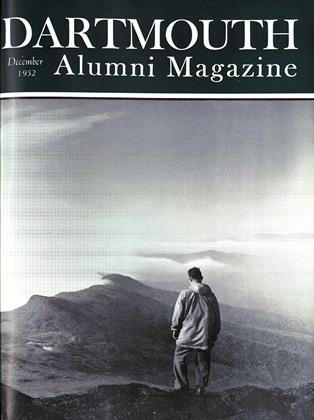Reply to Cardozo
To THE EDITOR: Let me be among the many, I hope, who are moved at last to respond to the complaints of Michael Cardozo '32. His letter in the November issue of the MAGAZINE stating that Dartmouth selection and education are inadequate because Dartmouth men are predominantly Republicans is an unwarranted and very unfair criticism of the College. He has made the same point before for the benefit of his own class in the '32 notes. Now his letter goes before all Dartmouth men through the letters column. It's time to call.
My quarrel with the professor is certainly not that Dartmouth men are overwhelmingly Republican, for that they certainly are. He must have been far removed from exposure to Republicans for a long time to draw the conclusion that they are such because Dartmouth's selection process picks matriculants from Republican families, or that a Dartmouth education turns Democrats into Republicans. Possibly the legal staff of the State Department and the law faculty at Cornell have kept him from meeting many Republicans, as my job keeps me from meeting many Democrats. If he did examine a few, he would find them educated by Harvard, Ohio State, West Oshkosh State Teachers and P.S. 48 as well as Dartmouth. Their common charactetistic, if they have one, would not be connected with educational background, or even family, but rather their way of making a living, for most of them, regardless of background, are connected with some profitmaking business activity. Profit is probably a red flag word, and possibly "poisonous" as well as trite, but it is a good one-word description of our still capitalistic society.
I submit that Dartmouth does not matriculate and graduate Republicans per se. Alumni are mostly in business, and most businessmen (estimate 80% or more) are Republicans, whether they were Phi Betes at Hanover or flunked the fifth grade at P.S. 48.
It is undoubtedly true that most Republicans, even those with degrees, cannot coherently defend their beliefs against a reasoned argument, and that they rely upon "poisonous cliches" concerning corruption, Yalta and Dean Acheson. The trouble, I say, is that most of them spend too much time trying to make a profit, and not enough time studying the issues and preparing coherent political statements. Those who get into politics, like Tom Curtis, can do better than that, but the rest will disappoint Mike Cardozo. Let him lead the next interrogation of his classmates into the "issues" surrounding their businesses, and he will not find the "poisonous cliches" or fuzzy thinking.
Professor Cardozo indicates a hope that the Great Issues course will "stir the thinking process," implying that such stirring will prevent future alumni from following the present group into the Republican party. Given that the Great Issues course greatly improves the discernment of its students, it will have to do much more if it's going to make Democrats out of Dartmouth businessmen. It may be a valid criticism of our country today that the Republican party is supported by an overwhelming majority of business people. Justification of Democrats and Republicans is not a part of the present argument. But to say that, because Dartmouth men are Republicans, Dartmouth has an inadequate selection program, or fails as a liberal arts college, is really "poisonous." It sounds like a desire to substitute indoctrination for education, to be sure that Dartmouth graduates a nicely rounded number of Democrats.
Burlington, Vt.
Webster Centennial
To THE EDITOR: The picture of the four '93 men in Daniel Webster costume in the October issue recalls to mind the Webster Centennial in the fall of 1901. I presume you are familiar with the fact that this costume or a similar one was worn by all the alumni in the big procession. There was a night procession and, as I recall, all the alumni who were in town for the event marched, by classes, in this procession in costume. We had graduated the June before and had a large group back in the graduate schools, so although 1901 brought up the rear of the alumni parade, we were represented by quite a large delegation.
Washington, D. C.
 View Full Issue
View Full Issue
More From This Issue
-
 Class Notes
Class Notes1918
December 1952 By ERNEST H. EARLEY, DONALD L. BARR -
 Class Notes
Class Notes1950
December 1952 By ENS. SCOTT C. OLIN, SIMOND J. MORAND III -
 Class Notes
Class Notes1935
December 1952 By HENRY R. BANKART, JOHN WALLACE -
 Article
ArticleDan'l Webster Still Lives
December 1952 By DR. CLAUDE M. FUESS '31h -
 Class Notes
Class Notes1915
December 1952 By PHILIP K. MURDOCK, RUSSELL J. RICE -
 Class Notes
Class Notes1928
December 1952 By OSMUN SKINNER, JOHN PHILLIPS
Letters to the Editor
-
 Letters to the Editor
Letters to the EditorAN OLD DARTMOUTH BALLAD
February 1921 -
 Letters to the Editor
Letters to the EditorLETTERS
July 1960 -
 Letters to the Editor
Letters to the EditorLETTERS TO THE EDITOR
FEBRUARY 1963 -
 Letters to the Editor
Letters to the EditorLetters to the Editor
FEBRUARY 1971 -
 Letters to the Editor
Letters to the EditorLetters to the Editor
September 1978 -
 Letters to the Editor
Letters to the EditorHave a Nice Millennium
MAY 1996

